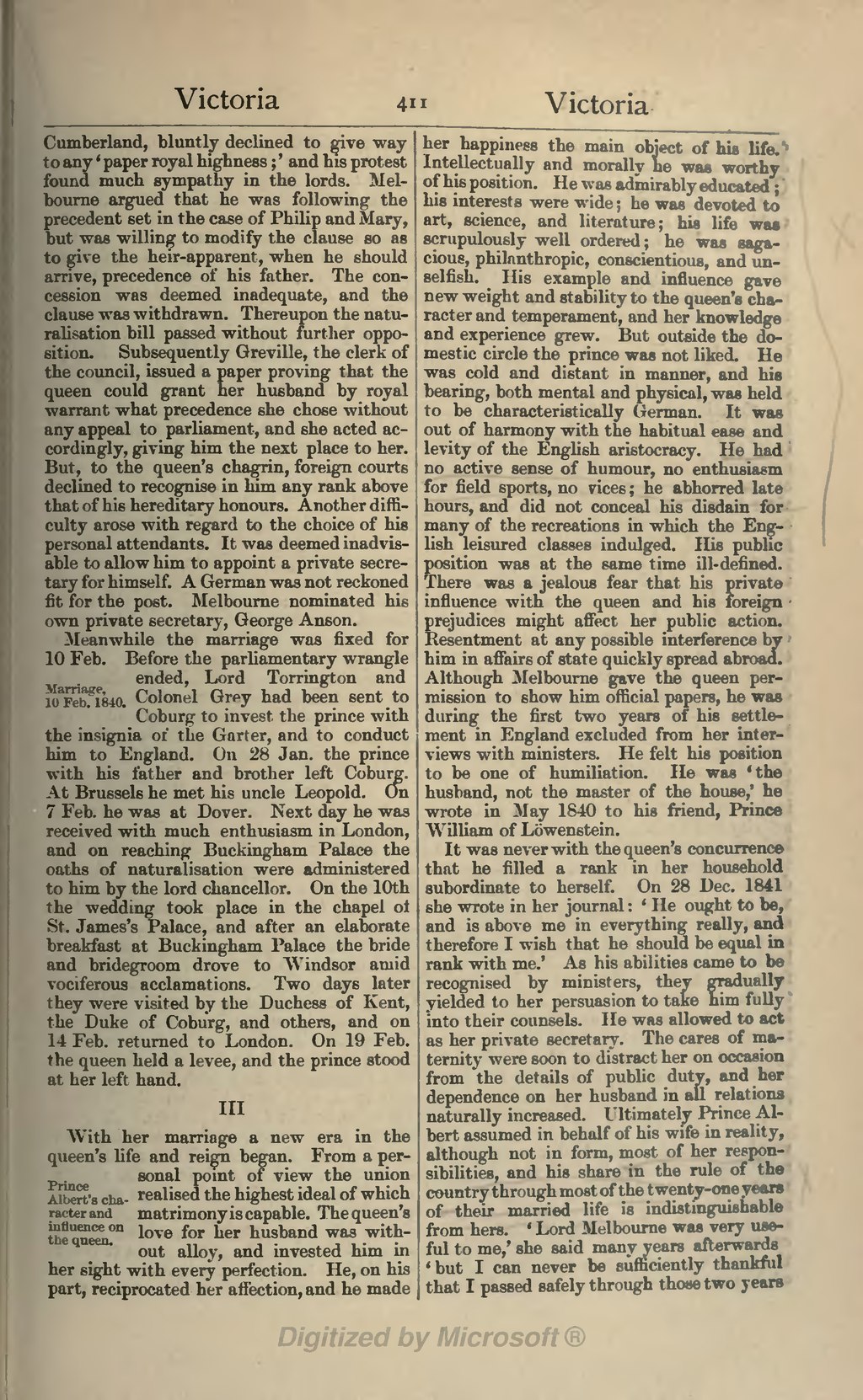Cumberland, bluntly declined to give way to any 'paper royal highness;' and his protest found much sympathy in the lords. Melbourne argued that he was following the precedent set in the case of Philip and Mary, but was willing to modify the clause so as to give the heir-apparent, when he should arrive, precedence of his father. The concession was deemed inadequate, and the clause was withdrawn. Thereupon the naturalisation bill passed without further opposition. Subsequently Greville, the clerk of the council, issued a paper proving that the queen could grant her husband by royal warrant what precedence she chose without any appeal to parliament, and she acted accordingly, giving him the next place to her. But, to the queen's chagrin, foreign courts declined to recognise in him any rank above that of his hereditary honours. Another difficulty arose with regard to the choice of his personal attendants. It was deemed inadvisable to allow him to appoint a private secretary for himself. A German was not reckoned fit for the post. Melbourne nominated his own private secretary, George Anson.
Meanwhile the marriage was fixed for 10 Feb. Before the parliamentary wrangle Marriage, 10 February 1840. ended, Lord Torrington and Colonel Grey had been sent to Coburg to invest the prince with the insignia of the Garter, and to conduct him to England. On 28 Jan. the prince with his father and brother left Coburg. At Brussels he met his uncle Leopold. On 7 Feb. he was at Dover. Next day he was received with much enthusiasm in London, and on reaching Buckingham Palace the oaths of naturalisation were administered to him by the lord chancellor. On the 10th the wedding took place in the chapel of St. James's Palace, and after an elaborate breakfast at Buckingham Palace the bride and bridegroom drove to Windsor amid vociferous acclamations. Two days later they were visited by the Duchess of Kent, the Duke of Coburg, and others, and on 14 Feb. returned to London. On 19 Feb. the queen held a levee, and the prince stood at her left hand.
III
With her marriage a new era in the queen's life and reign began. From a personal point of view the union Prince Albert's character and influence on the queen. realised the highest ideal of which matrimony is capable. The queen's love for her husband without alloy, and invested him in her sight with every perfection. He, on his part, reciprocated her affection, and he made her happiness the main object of his life. Intellectually and morally he was worthy of his position. He was admirably educated ; his interests were wide ; he was devoted to art, science, and literature; his life was scrupulously well ordered; he was sagacious, philanthropic, conscientious, and unselfish. His example and influence gave new weight and stability to the queen's character and temperament, and her knowledge and experience grew. But outside the domestic circle the prince was not liked. He was cold and distant in manner, and his bearing, both mental and physical, was held to be characteristically German. It was out of harmony with the habitual ease and levity of the English aristocracy. He had no active sense of humour, no enthusiasm for field sports, no vices ; he abhorred late hours, and did not conceal his disdain for many of the recreations in which the English leisured classes indulged. His public position was at the same time ill-defined. There was a jealous fear that his private influence with the queen and his foreign prejudices might affect her public action. Resentment at any possible interference by him in affairs of state quickly spread abroad. Although Melbourne gave the queen permission to show him official papers, he was during the first two years of his settlement in England excluded from her interviews with ministers. He felt his position to be one of humiliation. He was 'the husband, not the master of the house,' he wrote in May 1840 to his friend, Prince William of Lowenstein.
It was never with the queen's concurrence that he filled a rank in her household subordinate to herself. On 28 Dec. 1841 she wrote in her journal : 'He ought to be, and is above me in everything really, and therefore I wish that he should be equal in rank with me.' As his abilities came to be recognised by ministers, they gradually yielded to her persuasion to take him fully into their counsels. He was allowed to act as her private secretary. The cares of maternity were soon to distract her on occasion from 'the details of public duty, and her dependence on her husband in all relations naturally increased. Ultimately Prince Albert assumed in behalf of his wife in reality, although not in form, most of her responsibilities, and his share in the rule of the country through most of the twenty-one years of their married life is indistinguishable from hers. 'Lord Melbourne was very useful to me,' she said many years afterwards 'but I can never be sufficiently thankful that I passed safely through those two years
